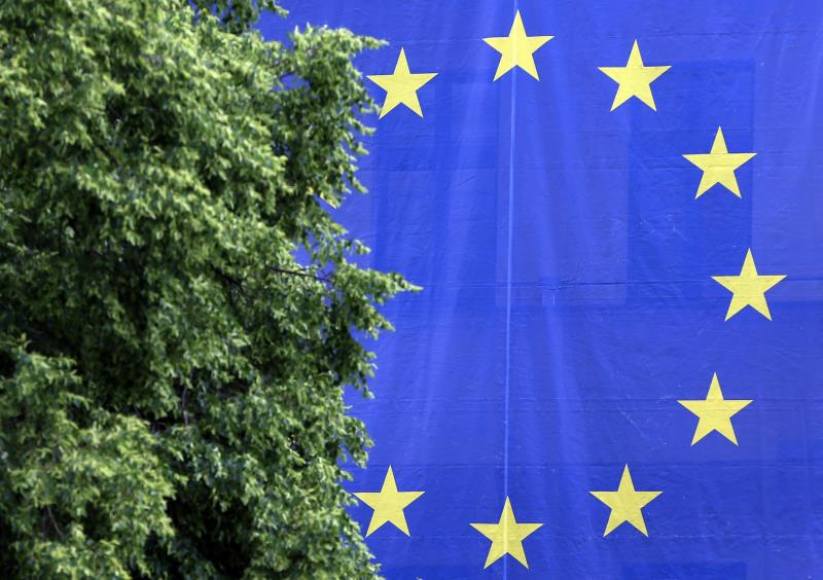www.aljazeerah.info
Opinion Editorials, May 2019
Archives
Mission & Name
Conflict Terminology
Editorials
Gaza Holocaust
Gulf War
Isdood
Islam
News
News Photos
Opinion Editorials
US Foreign Policy (Dr. El-Najjar's Articles)
www.aljazeerah.info
Seven Key Points to Understanding the EU Election Results By Laura Malvesí News4Europe, May 28, 2019 |
 |
|
| A European flag outside the Greens' Party headquarters, May 27, 2019 |
The concept of a united Europe is tarnished but still needs to be kept alive and there is an urgent necessity for a greener, more sustainable environment.
These two ideas came through as the voters' principal concerns in the European Union's parliamentary elections which garnered the highest turnout in 20 years.
Voters were not as Eurosceptic as many had augured but political support for the EU vision now rests on wider cross-party collaborations rather than the traditional left-right duopoly.
As predicted, Eurosceptic parties made gains but they did not consolidate their power in the European Parliament as much as they had hoped.
The center-right European People's Party and the center-left Socialists and Democrats (S&D), longtime bipartisan powerhouses in Brussels, were trimmed down and now must accommodate a growing Liberal Democrats (ALDE), which shares pro-European values.
The Greens also had a strong night, adding 19 seats to their previous haul to secure 69 overall in the 750-seat Parliament.
1. The time for multipartisan politics and collaboration has arrived
The EPP and the S&D will no longer boast a combined majority in the hemicycle for the first time in history.
The elections, held between May 23-26, have ended 40-years of bipartisan dominance where the two major parliamentary groups simply had to strike consensus between themselves to shift hefty policies through EU's legislative arm.
Now ALDE, which boosted its seat-share by 42, bagging 109, and the Greens will be key actors going into the next parliament.
2. The specter of Euroscepticism returns, but with less punch than anticipated.
Just as in 2014, whispers of an anti-EU Trojan Horse making its way into the bloc's institutions dissipated somewhat when the results came through.
Europhobes have bagged more than 50 seats in the chamber but lack sufficient numbers to form an influential coalition.
A question that remains to be answered is whether members of the shrinking European Conservatives and Reformists will abandon ship and align themselves with one of the two major Eurosceptic blocs, the Europe of Freedom and Direct Democracy, chaired by Brexit Party leader, Nigel Farage, or the far-right Europe of Nations and Freedom.
3. Choppy waters for Europhiles in Italy and France.
Although Eurosceptics remain far from any kind of majority in the European Parliament, right-wing, anti-Brussels outfits did manage to win national votes in France and Italy.
Marine Le Pen's far-right National Rally (RN), formerly known as the National Front, beat the liberal coalition backed by President Emmanuel Macron with 22 seats to 21 in the French vote.
In Italy, Matteo Salvini's League party, which pushes far-right policies, also came out on top, buoyed by collapsing support for the old center-left/center-right order in the country.
His outfit, a member of Italy's coalition government, secure 28 seats, 10 more than its nearest rival, the Democratic Party (PD).
Farage's Brexit Party also won the UK vote.
Le Pen and Salvini are in favor of devolving EU powers to national governments and have used the migrant crisis to underpin their anti-EU propaganda.
4. Environmentalist policies on the up.
Germany and Denmark, among others, have fueled solid results for Green parties, which boosted their share of seats by almost 20.
The push for environmentalists politics, which has brought thousands of youngsters to the streets in continent-wide protests every Friday led by the young activist Greta Thunberg, arrived at the heart of the EU.
Along with the liberal ALDE group, the Greens will play a strong hand in the upcoming renewal of the EU's institutions as Parliament appoints and approves a new leader and members of the European Commission.
5. Conservatives fall despite a solid showing from Hungary's Viktor Orbán, suspended from the EPP
The EPP maintained its position as the largest group in Parliament following the elections but it no longer holds the S&D at an arm's length.
It fell from 221 seats in 2014 to 180 in 2019, which includes the 13 won by its Hungarian associate, the Fidesz party of PM Orbán, which had its voting rights in the EPP suspended on the lead up to the election over its anti-EU stance.
Orbán's nationalist force took over 50 percent of the Hungarian vote. If this enfant terrible of the EPP decides to abandon its group, the center-right union will remain the strongest part in the chamber but lose out on 13 seats.
The S&D took a total of 146 seats, 44 down from its last outing.
6. An alternative liberal-leftist bloc would not work.
Left-wing groups, Greens and liberals fall just short of the necessary 376 seats for a majority with around 366 between them, which means there can be no absolute majority without the inclusion of the EPP.
The EPP, however, could technically make a coalition with the far-right and populists although this would be unlikely.
This new balance of power in the chamber could stutter progress when passing legislation, as there are likely to be three main ideologies battling it out for influence.
7. Brits punish the mainstream parties over Brexit.
The UK Conservative Party, the party of former leader David Cameron, the prime minister who called the Brexit referendum in 2016, as well as Theresa May, the outgoing PM whose tenure was cut short by Brexit, slumped to fifth place in the national vote.
***
Share the link of this article with your facebook friends
|
|
|
|
||
|
||||||


